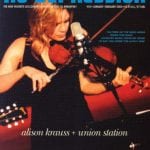Bill Frisell – A new intersection at the crossroads
When people talk about alternative-country, they usually mean country music that’s been influenced by rock ‘n’ roll. Similarly, when folks use the term jazz-fusion, they usually mean jazz that borrows from rock. But there’s another kind of alternative-country and another kind of jazz-fusion that bring together American rural music and improvisation — and this country-jazz may be the most innovative hybrid of all.
These two genres need each other. Jazz has nearly exhausted the possibilities of improvising on show tunes and blues; it desperately needs new source material, and the country/folk field provides a nearly untapped well. Country, likewise, seems stuck inside the same few chord changes and the same few variations on the ABABCB song structure. Jazz offers new harmonies and the improvisatory spirit to crack open old forms.
Seattle, of all places, has recently become a center for this music. The city boasts a rich history, of course, in rock ‘n’ roll, from Hendrix to Heart to Nirvana. But while Seattle has fostered occasional flourishes in jazz and country circles, its reputation in those genres has remained relatively underground. And that’s just the point. The absence of an established way of doing things has created an open space where a handful of experimenters have created new approaches.
The prime movers in Seattle’s country-jazz community are guitarist Bill Frisell and keyboardist Wayne Horvitz, both products of New York’s 1980s avant-garde jazz scene; singer-pianist Robin Holcomb, Horvitz’s wife and an art-music composer in the Laurie Anderson/John Zorn vein; banjoist Danny Barnes, founder of Austin punk-bluegrass band the Bad Livers, who moved in 1997 to Port Townsend (across Puget Sound from Seattle); and bassist Keith Lowe, an actual Seattle native who has played in rock, blues and bluegrass bands.
They came from different places and different backgrounds, but found in Seattle the opportunity to explore the hidden places where avant-garde jazz and old-time country intersect. What both musics have in common, they have discovered, is a reluctance to reassure the listener. The dissonant wail of Julius Hemphill’s alto sax and the high-pitched nasality of Clarence Ashley’s voice, the unresolved harmonies of Ornette Coleman’s “Lonely Woman” and the unsoftened truth of Dock Boggs’ “O Death”, are more alike than most anyone had supposed.
At the same time, country and jazz transform each other in ways that can be quite revealing. Jazz, for example, loses its urban timbre — the aggressive, busy sound of Duke Ellington’s A Train, Charlie Parker’s 52nd Street sidewalks and Sun Ra’s spacecraft — and gains a more rural coloring, filled with the same openness and unforced naturalism as the landscape photos on ECM Records covers. Country, on the other hand, gains a whole new set of paths that a melodic line might travel, opening new avenues of emotion.
A catalytic event for Seattle’s country-jazz scene was Frisell’s 1997 album, Nashville. At the suggestion of Nonesuch Records, Frisell traveled to Tennessee, where he found himself in a studio with Alison Krauss’ then-husband (harmonica player Pat Bergeson), her brother (bassist Viktor Krauss), and past, present and future members of her band (mandolinist Adam Steffey, banjoist Ron Block and dobroist Jerry Douglas). When these pickers tackled three vocal numbers associated with Neil Young, Hazel Dickens and Skeeter Davis, they were joined by Frisell’s old pal and Seattle neighbor, Holcomb.
On Davis’ 1962 country hit, “The End Of The World”, Block replicated the piano triplets of the original single on his banjo, but Frisell and Douglas played long, sustained notes in counterpoint to the swaying rhythm and pretty melody, injecting new harmonies and new tensions into the song.
Holcomb reinforced this uneasy feeling by pushing and pulling at the words, nudging some a quartertone one way or the other and fluttering others with vibrato. The source material was country, but the treatment was jazz, and the eerie sounds that resulted made the broken-hearted singer seem as if she really were at the end of the world — as if reality had become as evanescent as her voice.
Holcomb worked with Frisell again on her latest Nonesuch album, The Big Time. Amid the ten Holcomb compositions are two songs from Harry Smith’s Anthology Of American Folk Music: the Carter Family’s “Engine 143”, about a mother mourning a son lost in train wreck, and Buster Carter & Preston Young’s “A Lazy Farmer Boy”, about a young woman spurning a poor farmer’s marriage proposal.
Originally Appalachian ballads, these tunes have been transformed into experimental art songs suggesting Cassandra Wilson more than Patty Loveless. The underlying conflicts in these stories are heightened by the way Holcomb and harmony singer Barnes stretch and twist the melody, the way Lowe and drummer Andy Roth tie the rhythm into knots, and the way Frisell constructs nervous guitar figures that occasionally burst into cathartic roars.
A similar combination of ancient antecedents and modern methodology informs Holcomb’s own songs. For example, “Like I Care”, which climaxes with harmonies by Kate & Anna McGarrigle, contains five verses, each one beginning with two lines of free verse followed by a Carter Family-like repeating refrain. “Curl your hand inside another’s,” Holcomb sings, “and you’ll taste your first confusion/In case you didn’t notice, welcome to the start of ever after/Like I care, like I do/It says here I can fall in love without you.”
The parlor-song melody is simple, but the simmering instrumental harmonies, provided by Frisell and Horvitz, are sophisticated. Holding it all together is Holcomb’s strange, trembling voice, which always seems about to lose its grasp of the melody even though it never does. That uncertainty, which gives the music an edge that’s hard to ignore, is a shared characteristic of these Seattle country-jazz experiments.




